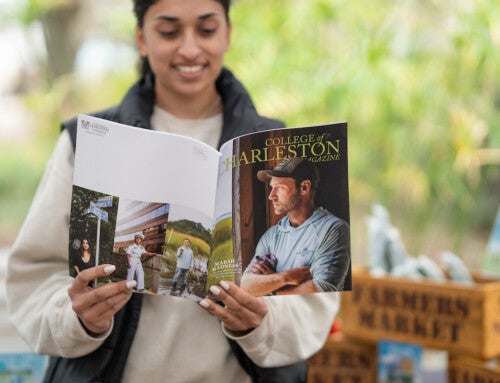The coronavirus pandemic has led us into uncharted territory. Instead of enjoying the spring weather and the final weeks of the semester, we’re stuck inside feeling worried and anxious. There’s a 24-hour stream of conflicting information on the news and it’s difficult to turn it off and shut down those nagging feelings of fear and concern.
Many students are trying to figure out where they’re going to live, how they’re going to keep their jobs to pay rent, how they’re going to take five different classes online all at once, and whether their families and friends are going to economically survive. That’s why, during these times of uncertainty, it’s important to focus on what we can control.
“These are uncertain times and the brain doesn’t like uncertainty,” says Rachael McNamara, health educator with the College’s Counseling Center. She’s also the advisor to the peer counseling group Students 4 Support, whose members created a video (see above) with information and tips. “Students need to challenge themselves to stay in the positive present and look for situations that make them happy,” she adds.
Now that CofC’s classes have moved online for the remainder of the spring semester, McNamara also has practical suggestions for students:
1. Separate what you can control, from what you can’t. Here are some things that you can do:
- Wash your hands frequently
- Limit gathering sizes
- Maintain 6 feet of distance
- Limit your consumption of COVID-19 media exposure
2. Connect with others
- Video chats
- Online games or Google meetups
- Take care of your body – exercise, sleep well, eat healthy foods and hydrate
3. Challenge yourself to stay in the present
- Seek out guided meditations from apps and sources like the UCLA Mindfulness weekly podcast. As coronavirus anxiety rises among consumers, many popular meditation apps like Headspace and Simple Habit are making their services free for a limited time.
Even in less stressful times, it’s all too common for college students to experience anxiety while managing class work, jobs and relationships. The additional stress of COVID-19 can feel overwhelming and result in poor sleeping, irritability, difficulty concentrating and fatigue. Writing or journaling is another tool to help students process fear and anxiety.
Psychology professor Sarah Robertson studies the effects of expressive writing on reducing anxiety and depression in students entering college. In her PSYCH 103 class, student-participants write intensely about their feelings for 20 minutes over a period of three days, and are followed up with at one and six months. Research shows that for some participants, this intervention significantly reduces students’ anxiety levels.
“What surprised me the most is the degree with which students are willing to engage,” says Robertson. “They are incredibly brave and this process can allow them to step back and reevaluate issues in their lives.”
Robertson has expanded her research and is currently exploring the effectiveness of writing interventions in a lab versus an online setting. For now, she urges students to be mindful and to reach out to a licensed professional therapist if they are feeling overwhelmed.
McNamara says the Counseling Center is responding to student’s needs with a variety of resources. Staff will conduct their scheduled appointments by phone and their check-ins by email or phone. They are also reaching out to existing clients to offer possible teletherapy options where technology is available.
Additional resources for managing anxiety:
- TAO (Therapy Assistance Online), a new resource that can be found on the Counseling Center site, is a self-paced online module to help students build emotional well-being skills.
- Students 4 Support is available by texting “4support” to 839863 from 12 to 9 p.m. Monday through Thursday.
- Students can reach the Counseling Center at 843.953.5640 or [email protected].
- For life threatening mental health emergencies or immediate threats, please call 911. For more information visit the Counseling Center’s Emergencies & Crisis Assistance webpage.



